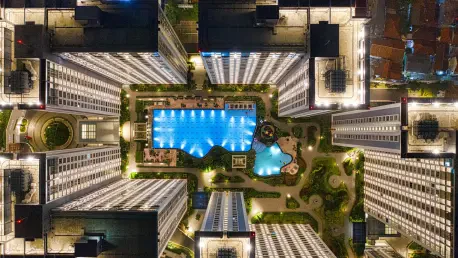The hospitality sector is undergoing a transformative evolution, driven by advancements in artificial intelligence and robotics, sparking a debate on the potential of fully automated hotels. With these innovations setting the stage, questions arise about whether human staff will be entirely replaced by machines, leading to a redefined experience in hotel services. This article investigates the current applications, potential benefits, and challenges faced as hotels race toward a tech-savvy future, considering the possible blend of automation with human touch to optimize guest satisfaction.
Current Integration of AI in Hospitality
Technology Paving the Path
The hospitality industry has embraced artificial intelligence with increasing enthusiasm, evident in both small and large hotels globally integrating AI-driven solutions. These technologies include advanced property management systems (PMS), chatbots for customer communication, and data analytics for personalized marketing. The use of AI in sectors such as dynamic pricing and forecasting further demonstrates the sector’s commitment to leveraging new technology to improve efficiency and guest experiences. AI also aids in enhancing services that prioritize sustainable practices, exemplified by companies like TheSqua.re, which uses AI to evaluate sustainability in serviced apartments, blending technology and eco-consciousness.
Significant Hotel Deployments
Major hotel brands are already actively integrating AI and robotics into their operations. Notable examples include Marriott’s use of AI chatbots and Hilton’s deployment of robots for concierge tasks, which illustrate the shift towards automated guest interaction. The Henn-na Hotel in Japan, known as the world’s first fully robot-operated hotel, stands as a significant case study for the use of robots in hospitality. These advanced implementations redefine operational efficiency through tasks such as food delivery, luggage handling, and even front desk assistance, thus setting a precedent for other entities contemplating full or partial automation throughout their chains.
Challenges and Operational Realities
Technical and Financial Hurdles
Despite advancements, the integration of robots in hotels is not without its challenges. Technical issues and significant maintenance costs pose considerable obstacles. The example of Japan’s Henn-na Hotel—which faced operational hurdles leading to the dismissal of hundreds of robots due to underperformance—underscores the complexities associated with full automation. The initial high costs and unforeseen technical issues demonstrate the need for a balanced approach, combining technology with human oversight to ensure seamless operations while overcoming early-stage challenges that accompany such groundbreaking changes.
Balancing Automation with Human Interaction
Equally important is understanding customer response to automated services. The Japanese hotel model revealed a critical insight: while robots offer efficiency, they lack the empathetic interaction many travelers expect. Automation can manage routine tasks, yet human assistance remains vital for activities demanding empathy and nuanced communication. Hotels are finding that the most successful approach may lie within a hybrid model, where automation handles repetitive duties, allowing human staff to focus on areas requiring personalization. This balance strives to maintain high guest satisfaction levels by merging technological advancements with traditional hospitality qualities.
Customer Preferences and Industry Trends
Emerging Consumer Expectations
The evolving landscape of guest preferences suggests a shift toward a willingness to embrace technology-driven experiences. There is growing generational acceptance for non-human interaction at a rapid pace, as younger travelers readily adapt to digital solutions. Service robots are transitioning from being novelties to necessities in some segments, pushing hotels to consider them as essential differentiation tools. Some hotel chains may capitalize on robots to target tech-savvy demographics, offering a unique value proposition while optimizing operations and potentially reducing operational overheads without detracting from the quality of service.
Differentiation through Technological Enablers
The question of how hotels differentiate themselves in a tech-driven market has prompted diverse strategies. Upscale accommodations may continue to focus on humans, preserving the intricate service touch that defines luxury experiences. Conversely, budget and mid-range establishments might be more inclined towards full automation, leveraging robots to streamline costs and improve operational efficiencies. As technology increasingly influences customer choices, hotels are compelled to redefine their service offerings, ensuring that technological implementation aligns with their brand identity while addressing the broad spectrum of consumer expectations.
Looking Forward
Future Implications for the Hotel Industry
As the industry progresses toward 2030, it is anticipated that AI and robotics will not wholly replace humans but will augment their roles, creating new opportunities and reshaping traditional job functions. Hotels may increasingly rely on technology to automate mundane tasks, allowing staff to concentrate on complex responsibilities requiring a personal touch. New roles associated with AI and robotic technology management will likely emerge, paving the way for innovative service delivery methods. This evolving dynamic embodies a future where technology seamlessly integrates with human capabilities to enhance the hospitality experience.
Synergy of Human and Robotic Personnel
The hospitality industry is currently experiencing a significant shift, spurred by innovations in artificial intelligence and robotics. This transformation sparks an intriguing dialogue about the possibility of fully automated hotels, challenging traditional notions of service and guest interaction. As these technologies become more ingrained in operations, questions surface regarding the likelihood of human staff being completely replaced by machines, which could lead to a novel, tech-focused hotel experience. This exploration delves into how these advancements are presently applied and examines the potential advantages and obstacles they pose for the sector. While hotels rush to embrace cutting-edge technology, there is contemplation on whether a harmonious blend of automation and human interaction might be the key to maximizing guest satisfaction. It may not be about choosing one over the other but finding the right balance, integrating digital capabilities while retaining the warmth of human engagement.









